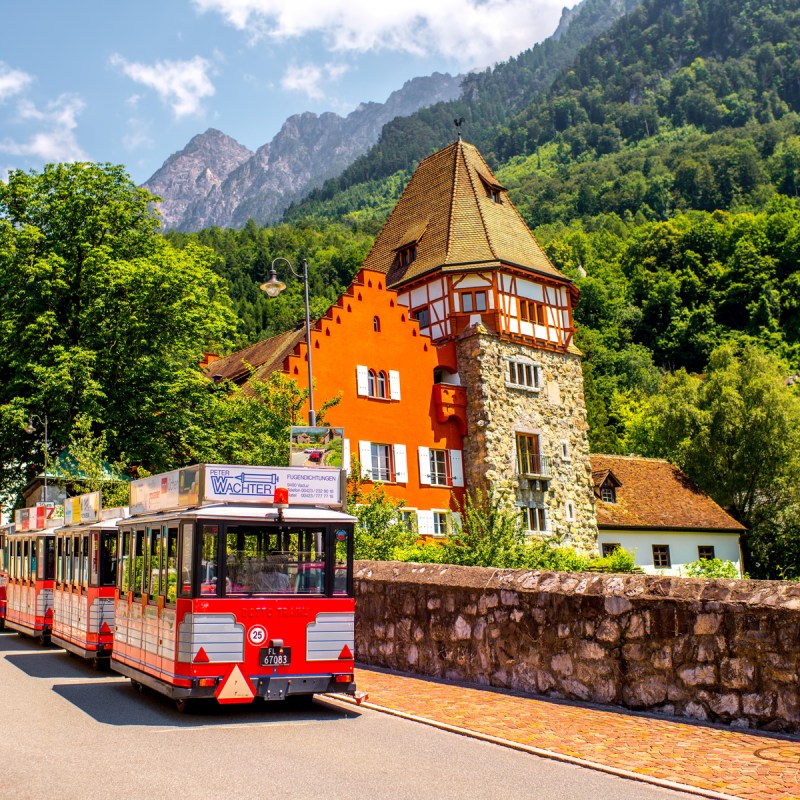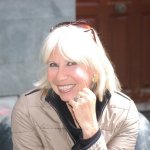
Liechtenstein is a principality located in the Upper Rhine Valley in the Alps, bordered by Austria and Switzerland. It’s Europe’s fourth-smallest country and double landlocked, which means it’s surrounded by countries with no direct access to the sea. Given its location in the Alps, it comes as no surprise that over half of the territory is mountainous. The capital is Vaduz, and the language is German, but the currency is the Swiss Franc.
Videos by TravelAwaits
Liechtenstein has no airport but a good road network, so you can easily reach it from any location in Austria or Switzerland. Once I left Switzerland and entered Liechtenstein, I was hooked. You are greeted by a huge castle on a hill, can actually get your passport stamped (just like in San Marino), see the mountains and green woods and pastures, find quaint museums. You can visit a manmade lake with no fish, and, my favorite: a falconry.
If you love skiing and any kind of winter sport, you have come to the right place. The neighboring countries may be more famous, but Liechtenstein, being so small, has far less crowded slopes, and they are of equal quality. There is also a great network of hiking trails to be enjoyed in the summer; and, last but not least, Liechtenstein’s wines are delicious, and you can taste some at the Prince’s very own winery.

1. Be Charmed By Vaduz
Liechtenstein, small as it may be, is a very important world financial center and a very wealthy country. So are the citizens — not to mention the royal family. They reside in the castle high up on a steep hill, known as Schloss Vaduz, looking just like you might have read and seen in fairytales. Prince Hans Adam II and his family live in the 130-room castle, and therefore, it is not open to the public. But you can get a closer look at the medieval castle by climbing up the wooden footpaths that lead to the rock terrace. The paths are marked by viewpoints which also bear some explanations about the history of the castle and the Alps. If you happen to be in Liechtenstein on August 15, you may get lucky and be able to enter the rose garden and have a closer look. This is Liechtenstein’s national holiday, and the public, locals or tourists alike, are allowed in, provided they have booked an online ticket. It’s free and there is a reception on the lawn and the day ends with a huge firework display.
What makes Vaduz so charming are the stunning views of the Alps and the river Rhine from just about anywhere. It’s easy to get around because it’s a small city. Stroll along the “main street,” Stadtle Street, Vaduz’s one and only pedestrian street, and look at all the lovely shops, cafes, and museums, all located along this street. One you shouldn’t miss is the modern Kunstmuseum Liechtenstein. But art lovers will already enjoy the many statues and sculptures along Stadtle Street.
If you are a stamp collector or have friends who are, stop by the post office, called Postwertzeichen Stelle, and buy a selection of stamps. They are desirable collectors’ items and make a great gift.
Another beautiful landmark to visit in Vaduz is the St. Florin cathedral. You’ll love the stained glass windows and the history connected to the parish church raised to the status of a cathedral.
If you are hungry after all that exploring, consider the Michelin Star Restaurant Torkel. Another fun thing to do in Vaduz is to visit the Liechtenstein Centre (tourist office) on Stadtle Street and get your passport stamped. A souvenir of a very special kind!
The best time to visit is mid-May to late September when the weather is mild, although there can be rain showers at any time of the year and, of course, snow in the winter.

2. Hike The Liechtenstein Trail
If you really want to get to know this beautiful country, put on your walking shoes and hike the 47-mile Liechtenstein Trail, or part of it. Liechtenstein is really a hiker’s paradise and there are nearly 250 miles of well-kept and signposted hiking trails that traverse all 11 municipalities. On this site, you also find very good suggestions on how to break up the trail into stages if you don’t feel fit enough or simply don’t want to do it in one go.
One highlight is the Gutenberg Castle that stands on a hillside in the southernmost municipality of Balzers. The castle started out in the Middle Ages as a church and cemetery, and, although it fell into ruin for centuries, it was lovingly restored between 1905 and 1912. You can walk to the castle from the nearby village.
For something unexpected, you might want to visit a llama and alpaca farm in Triesenberg. Your palate and stomach will appreciate the delicious Kaesespaetzle (cheese mini dumplings) in the Restaurant Zum Loewen in Schellenberg. As you can see, there is more to the Liechtenstein Trail than just hiking.

3. Explore Liechtenstein’s Rural Past
Though Liechtenstein’s present wealth may be derived from banking and financial services, it is, after all, a rural country, and farming was the norm in centuries past. While you are in Schellenberg, take the opportunity and visit the Farmhouse Museum. It is located in a wooden farmhouse that was first built in 1518, completely from timber, even the nails and bolts were made from wood. Iron was avoided at the time. Saying “first built” is of special significance, because farmhouses of that style could be, and were, dismantled and moved when the owner of the land moved to another location. It happened with this farmhouse three times over the centuries and is the reason why only a handful have survived. Inside are farm implements from the late Middle Ages as well as intact and furnished living rooms and bedrooms, a clock from the beginning of the 20th century, and an old sewing machine. This beauty is also called Biedermann Haus after the last owner.
4. Learn What A Curta Is
Have you ever wondered what the world of writing and accounting was like before the arrival of computers? Get an education at the Calculator and Typewriter Museum in Schaan/Vaduz. And take the kids so they can see that there was life before the internet! This fabulous museum houses over 250 antique typewriters and calculators, many with original instructions. Among them are the famous Curta, the world’s smallest mechanical calculator (which was designed and manufactured in Liechtenstein), and the aptly named Enigma encoding machine, used by the German army during WWII.

5. Sample The Prince’s Wines
Liechtenstein’s fuerst (Prince) doesn’t only own castles, priceless artworks, and banks, but also vineyards, and you can have the pleasure of sampling his princely products. The Herawingert winery in Vaduz is located in one of the best wine-growing regions in the Rhine Valley. Due to the southwest slopes and mild climate as well as excellent soil, it produces first-class pinot noir and chardonnays. Tastings can be arranged by appointment and take place either in the Barriquesaal or the Bacchusstube. For details of the tastings and prices, head here.

6. Hit The Slopes At Malbun
There is only one major ski resort in Liechtenstein, and that’s Malbun. Major is to be taken with a pinch of salt because Malbun is tiny. There are only a handful of hotels, and a few lifts but no crowded slopes, noisy après ski and other things one usually associates with popular ski resorts. Here you’ll have a most romantic and calm ski experience, much like in the good old days without mass tourism. The access road from Vaduz, though, is a tricky one, full of steep gradients and sharp corners, so, unless you are a very experienced winter driver, you are better off taking the local bus or a taxi. But, believe me, it’s worth it.
7. Let The Falcons Fly
Imagine being close and personal to such majestic birds of prey as eagles, hawks, and falcons, even seeing them land on your own gloved fist. Falconer Norman Voegli (nomen est omen, as Vogel in German means “bird”) is the owner of falconry and hotel Galina in the mountains of Malbun. Every Saturday and Sunday from June to October, he puts on a great show and, expert that he is, will tell you all you ever want and need to know about birds of prey, their habits, and how to care for them.
He also arranges hiking tours with falcons that follow him like pets. This is one of my personal favorite things to do in Liechtenstein.
Pro Tip
Liechtenstein is a mountainous country, so even if you don’t plan to hike, bring good walking shoes, even for exploring Vaduz. Also, be prepared for occasional rain showers.
There is no nightlife to speak of in Liechtenstein. The locals tend to go to bed early.
Due to international finance and banking activities, English is widely spoken. The currency is the Swiss Franc, and you need cash for small expenses like bus fares.
